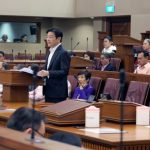Facebook’s (now part of a larger company called Meta) CEO Mark Zuckerberg announced plans to build a ‘metaverse’ recently, with Microsoft also following suit shortly after. While it’s still an ambiguous concept, the main idea rooted in science fiction integrates the trio of physical, virtual and digital realities.
As it stands, Facebook is reportedly already employing close to 10,000 staff on their virtual (VR) and augmented reality (AR) hardware products, and also announced plans to create another 10,000 jobs in the European Union over the next five years.
Immersive technology has already been popular with companies looking for an edge in Singapore, according to Professor Damien Joseph, an associate dean (undergraduate academics) at Nanyang Business School, NTU.
Locally, some immersive technologies have been seen, in property sales by local real estate company PropNex, as well as car sales by German automotive manufacturers Audi in Singapore.
Will there be money to be made in the metaverse?
Prof Joseph believes there is significant economic potential to the metaverse and said: “It will spur the development of hardware, software, and downstream services.
“Organisations will invest time, money and effort in developing a virtual presence, for meetings, social gatherings and conferences.”
The difference now compared to previous digital iterations such as Second Life (a real-time, avatar-based social space released in 2003) is the use of virtual and artificial reality. In fact, the increased level of immersion makes the use case even stronger than before!
He added the platforms on the metaverse will likely “collect, analyse, and sell insights on our behaviours, interactions and experiences”.
Work itself could change
The metaverse could also play into the future of hybrid workplaces, bridging the gap between in-person and remote working.
Prof. Joseph believes that it could be possible to work with geographically dispersed team members, yet feel like they’re in the same room, sitting next to you and working on projects, with prototypes 3D-printed at team members’ sites.
“It could go beyond hybrid or physical meetings, really. The whole point of the metaverse is to simulate the physical world without the constraints of space and time– you could travel from Singapore to Barcelona for a meeting in an instant, and in the next moment have another meeting in Hong Kong, for example.”
And what about jobs?
The billion-dollar question: what are some of the jobs birthed with the metaverse, and what local opportunities could be launched by Singapore-based enterprises to aid in building it?
Associate Professor of NUS Business School and co-director at NUS Business Analytics Centre James Pang Yan shared some key technical and commercial jobs that could be required to realise the economic potential of the metaverse.
Singapore’s could play an important role in the global metaverse ecosystem, Prof Pang added.
“Singapore does have unique advantages, due to our excellent education system, to provide talents in the relevant fields mentioned earlier, particularly in blockchain, AI, cloud computing, and AR/VR, for metaverse development.
“Singapore is also a perfect testbed to experiment the new economic and governance models in the metaverse, particularly the crypto economy and to test decentralised autonomous governance, because of our comprehensive and flexible regulatory frameworks.”
In addition, there are also new jobs for the ‘exploiters’ of the metaverse, according to Dr Leong Mun Kew, director of Graduate Programmes at the Institute of Systems Science at the National University of Singapore.
“There will be roles in creating the metaverse’s applications from new digital industries. They could be in gaming, or matchmaking, medical, or sports. The jobs that could ensue could range from content creators, interaction designers, experience engineers… we’re just looking at the tip of the iceberg.”
And upstream job creation could also happen, given “you’ll need people who will build the tools used by these content creators and interaction designers”, Dr. Leong believes.
“And there will be workers who will build the tools used by those who build the tools…”
What industries could Singaporean workers look at?
There are avenues that Singaporean workers could try to ramp up their skillsets to try to leap on the bandwagon.
Prof. Joseph shared: “As with all things new, there is a shortage of talent in developing immersive technologies. Most of the talent currently is in research labs and immersive game development companies.”
Alternatively, other bets could be for Singapore to help police and govern the metaverse from a financial standpoint, given the country’s strong global reputation. Perhaps there could be roles in corporate governance, or for new skillsets for those in financial accounting.
Dr. Leong elaborated: “The metaverse is a new frontier with all the attendant risks and potential rewards. It’s not precisely new but also not just old wine in new bottles, and the Covid-19 pandemic has also pushed companies to look closer into digitalized engagement,” he shares.
“Some key questions that need to be asked is about data ethics and AI biases: will the metaverse help or worsen the issues society has with these, currently?
“In addition, digital currency such as Bitcoin may have been institutionalised, but according to some sources, high percentages of transactions using them are for illegal activities.
“Countries will certainly be looking at the metaverse from a taxation standpoint, so there’ll have to be some form of the regulatory framework to do so.”
Read More: 5 Technology Recruitment Trends in Singapore in 2021
So, in a nutshell…
Exactly what does this new trend mean for Singapore’s workers? Dr. Leong shared his view on future-proofing ourselves, saying: “Don’t worry so much about predicting the future and being obsessed with being correct.
“There’s no point in saying you should have bought bitcoins when they were ten bucks; or that you should have learnt to code when you were younger.
“It’s really about having a resilient and curious mindset, coupled with the perseverance to practice when you want to be good at something new.
“There are no shortcuts. If you want to play football, you have to kick the ball 10,000 times. If you want to be a programmer – that’s 10,000 lines of code.
“Nothing you do today will future-proof you for a tomorrow you don’t know. But developing the right attitudes and discipline will!”















